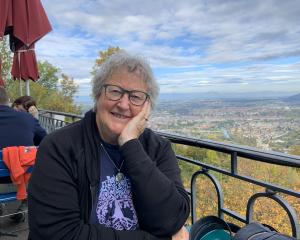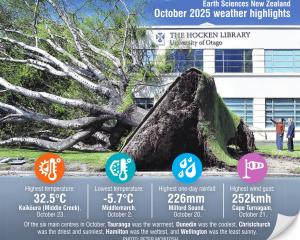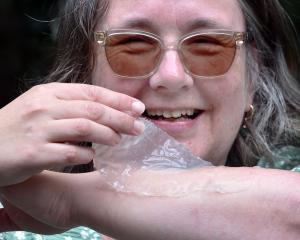
Fed up with the length of time it is taking to introduce bowel cancer screening in New Zealand, Beat Bowel Cancer Aotearoa has collaborated on the initiative with its sister charity in Australia and Pharmacy Brands.
Chairwoman Dr Sarah Derrett said the kits, which will sell for $52.15 plus GST, would give people aged 50-74 the chance to be proactive about monitoring their own health.
The kits will not be available in Dunedin until early next week.
The organisation was concerned national screening could still be a decade away when New Zealand had the highest incidence of the disease in the world and its mortality rates from the disease were among the world's worst.
More than 1250 New Zealanders die from bowel cancer a year. This is more than the total deaths from breast and prostate cancer.
The Ministry of Health's "we know best" attitude, and the failure of successive governments to take action, left New Zealand 10 years behind other countries which had screening programmes, Dr Derrett said.
"As a group of people directly affected by bowel cancer we don't feel we have been well-served by this attitude." While people could already seek a faecal occult blood test through their doctor, there had been no opportunity, until now, to buy a kit over the counter.
Those who completed a kit would be required to provide their general practitioner's contact details and the doctor would be advised of the result.
Dr Derrett said it was difficult to know how many people would buy the kits, so it was hard to estimate the possible effect on disease detection.
A positive result would not necessarily mean someone had cancer, but would indicate further investigation was needed.
Early detection was the key to improving survival rates, because 75% of bowel cancers could be cured if caught early.
She accepted there was difficulty already in meeting demand for diagnostic services in some areas and those who needed further investigation would need to discuss the options available with their doctor.
Dr Derrett said a national programme could potentially save about 270 lives a year.
The screening kits were not designed to compete with or replace such a programme. However, the kits gave people in the 50 to 74 age group, where the risk was increased, a simple way to seek screening in the meantime.
Dr Derrett emphasised that anyone with bowel cancer symptoms should seek medical advice promptly.
These symptoms were persistent rectal bleeding, recent persistent change in bowel habits, a lump or mass which could be felt in the abdomen, and persistent or recurring abdominal pain.
People with a family history of bowel cancer should also discuss this with their doctor.
It was also important to remember that some cancers did not bleed, so the test could show a "false negative" result where no bleeding was found and yet the person might have cancer, she said.
The opposite was also true.
A person could have a positive result and not have cancer because the bleeding might have another origin.
Dr Derrett said the immunochemical faecal occult blood tests, which will be marketed under the brand BowelScreen Aotearoa brand, were easy to use and required no handling of faeces or dietary or medication restrictions.
After completion, the tests are posted away for analysis in Australia.
The kits will be available in 300 pharmacies around the country (Unichem, Amcal, Life Pharmacy, Care Chemist and Radius outlets).
A screening pathway indicating who should and should not seek screening is available on the Beat Bowl Cancer website www.beatbowelcancer.org.nz.
Call to Action
Beat Bowel Cancer Aotearoa has listed 10 areas it wants to see action in a document "2015 Call to Action" launched this week and sent to all members of Parliament. It wants. -
• A national screening programme fully in place by 2015.
• A maximum four-week wait between a GP referral and specialist's visit.
• Maximum two-week wait for full diagnostic examination after seeing a specialist.
• Improved access to drug treatments for advanced bowel cancer.
• Systematic and regular follow-up for those diagnosed.
• Regular and transparent reporting on bowel cancer.
• Education to raise awareness of the ideas.
• Equitable access to bowel cancer services.
• National bowel cancer management guidelines and standards.
• A multi-disciplinary approach to the care of those with the disease.












